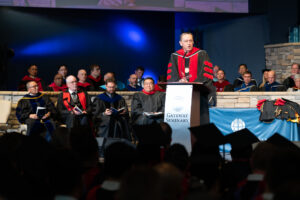
JACKSON, Tenn. (BP)–The younger generation of Southern Baptists will shape the future of the denomination, a stewardship it must not take lightly, R. Albert Mohler Jr., said Oct. 9.
Mohler, president of Southern Baptist Theological Seminary, delivered the closing address of the “Southern Baptists, Evangelicals and the Future of Denominationalism Conference,” held Oct. 6-9 at Union University in Jackson, Tenn.
The rise of secularism and the fall of cultural Christianity in the deep South over the past two decades have conspired to make the “20-something” generation crucial for defining the mission of the Southern Baptist Convention over the next 10 to 20 years, Mohler said.
“When we look at the numbers (in the SBC), all of a sudden, they aren’t going up any more,” Mohler said. “We find ourselves in a situation in which we have to ask ourselves some very basic questions … and they are questions of a denomination headed toward a crisis.
“I’m thankful it’s not the inerrancy crisis that we lived through in the 1970s and 1980s, your generation is a generation of beneficiaries of that controversy,” Mohler added. “But you must be a part of forging a new identity for the Southern Baptist Convention.”
Young Southern Baptists must not be fixated on numbers or statistics but must fix its gaze on faithfulness to God’s Word, the task of taking the Gospel to the nations and the glory of God, Mohler said.
“Those (numbers) are not unimportant, but it is the heart of the denomination that is the bigger issue — the clarity of our vision, the essential importance of our mission,” Mohler asserted. “It is going to be yours and you are going to decide what to do with it.”
The SBC is experiencing the death of cultural Christianity because the faith no longer holds the spiritual franchise it once did in the Bible Belt, Mohler said.
“Any denomination that bases its future on the confidence of cultural Christianity deserves to die with that culture when it dies,” he said. “It [a new identity] is not something we can create with a new slogan, for new slogans will not save us. There is a need for a resurgence of Great Commission passion, vision, commitment and energy in our denomination.”
“The Great Commission was the singular reason why the Southern Baptist Convention came together in 1845,” Mohler added. “It was the cause of the Gospel that called Southern Baptists together and only the cause of the Gospel will keep us together, only the cause of the Gospel is sufficient as a reason for us to be together.”
A refocusing on the Great Commission is going to be costly, Mohler said, because it will require asking questions that have not been asked within the SBC for several generations and dealing with issues not previously considered.
“We were not called simply to receive what has been handed to us in terms of structures and continue it because of brand loyalty,” Mohler said. “We’ve been called to be a church on mission.
“The vision before us is not the perpetuation of the Southern Baptist Convention, but the call of the nations to exult in the name of the Lord Jesus Christ,” Mohler added. “The great dynamic of the SBC cannot be to make certain that our statistics are healthy and that our charts point ever upward; it has to be that the glory of God would be evident in persons hearing the Gospel and responding to the Gospel and the establishment of godly churches that are ruled by Christ through His Word and to show all that the church is called to show in terms of the fruit of righteousness and the power of the Gospel.”
The SBC faces numerous challenges, including a generational shift in leadership from older to younger, Mohler said, and the younger generation will largely determine the denomination’s future health. He added that the current generation of students matriculating at Union and in other colleges, universities and seminaries are defined by several realities:
— A strategic hinge generation. It will determine the shape and substance of local churches.
— A generation of social transformation. It will determine the “new normal” in defining the church and its mission.
— A generation of global responsibility. Massive advances in transportation, travel and communications have made the world smaller and given this generation ready access to the entire globe.
— A generation marked by spiritual confusion. Questions of God, religion and church are not important to young people in America. “You who are committed Christians are going to be providing leadership to a denomination that is going to have to be ministering to people whose basic response may not be rejection of the Gospel, but merely a shrug,” he said.
— A generation of institutional disinterest. Commitment to institutional forms typically does not pass easily from one generation to the next. This generation must not view the SBC and its denominational machinery as ends unto themselves, but must work to ensure that local SBC churches are faithful Gospel outposts seeking to exist for the glory of God, he said.
— A generation of perishable promise. It has a limited window of time — one or two decades — to own the stewardship of steering SBC churches onto the path of greater faithfulness to God’s Word and the Great Commission.
Cultural Christianity and “easy-believism” must no longer rule the day in the SBC and in local church bodies, Mohler said. The younger generation must be willing to plant its feet upon sound doctrine and faithful Gospel missions if local churches and the denomination are to have a healthy future, he said.
“Do not give your life to the SBC because your grandmother was a Southern Baptist,” Mohler said. “Please do not invest your energies in the Southern Baptist Convention because you want to save something as an important artifact of American religion and southern culture and whatever else.
“Give yourself to the SBC because you see this really can be a denomination that is transformed by a resurgence of Great Commission passion to reach the world for the glory of God, a denomination ready to ask the hard questions and to let goods and kindred go in order to do what God would have us do in the generation ahead,” Mohler urged. “I am not imploring you to leave the Southern Baptist Convention; I am imploring you to save it.”
–30–
Jeff Robinson is director of news and information at Southern Baptist Theological Seminary.














